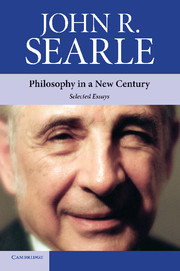Book contents
- Frontmatter
- Contents
- Original place of publication of the essays
- Introduction
- 1 Philosophy in a new century
- 2 Social ontology: some basic principles (with a new addendum by the author)
- 3 The Turing Test: fifty-five years later
- 4 Twenty-one years in the Chinese Room
- 5 Is the brain a digital computer?
- 6 The phenomenological illusion
- 7 The self as a problem in philosophy and neurobiology
- 8 Why I am not a property dualist
- 9 Fact and value, “is” and “ought,” and reasons for action
- 10 The unity of the proposition
- Name index
- Subject index
- References
10 - The unity of the proposition
Published online by Cambridge University Press: 05 June 2012
- Frontmatter
- Contents
- Original place of publication of the essays
- Introduction
- 1 Philosophy in a new century
- 2 Social ontology: some basic principles (with a new addendum by the author)
- 3 The Turing Test: fifty-five years later
- 4 Twenty-one years in the Chinese Room
- 5 Is the brain a digital computer?
- 6 The phenomenological illusion
- 7 The self as a problem in philosophy and neurobiology
- 8 Why I am not a property dualist
- 9 Fact and value, “is” and “ought,” and reasons for action
- 10 The unity of the proposition
- Name index
- Subject index
- References
Summary
This article is about an old problem, but one that is seldom discussed in contemporary philosophy. Here is the problem: because a proposition, such as for example the proposition that Socrates is bald, consists of more than one element, how is it that the different elements of the proposition are connected together to form a unified whole? The problem has both a semantic and a syntactical version. In the semantic version it comes out as: How are the meaningful elements of the proposition connected to produce a single unified proposition? And in the syntactical version it comes out as: How are the words in the sentence organized to produce a meaningful sentence, as opposed, for example, to a meaningless jumble of words, or simply a list? I think contemporary discussions in both semantics and syntax just miss the problem and do not see how it presents a difficulty for their analyses. Thus, for example, on some versions of the direct reference theory and the corresponding doctrine of singular propositions, we are to think of the proposition that Socrates is bald as an ordered pair consisting of the man “Socrates” and the property “baldness.” But that cannot be right, because then the proposition would consist of two ordered elements. There is this man and this property, what do they have to do with each other? How does any unity emerge from that? The situation in syntax is just as bad, maybe worse.
- Type
- Chapter
- Information
- Philosophy in a New CenturySelected Essays, pp. 181 - 196Publisher: Cambridge University PressPrint publication year: 2008
References
- 1
- Cited by



